The West African country Nigeria is one ethnically diverse state with more than 250 ethnic groups speaking over 500 languages. Out of all the tribes in the country, we have five major groups dominating the Nigerian enclave; the Hausas in the North top the list of the ethnic groups in Nigeria followed by the Yorubas in the Southwest, and the Igbos in the Southeast. These ethnic groups are distinguished by their diverse cultures, beliefs, religion, occupation, and many more. For this article, we are going to x-ray the top five ethnic groups in Nigeria and their diverse cultural and religious identities.
Ethnic Groups in Nigeria
The major ethnic groups in the Nigerian enclave include;
Yoruba
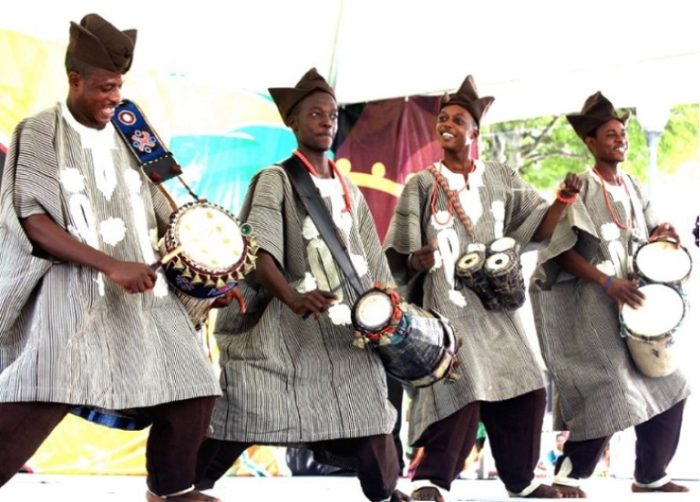
- Region: South West and North Central
- States: Lagos State, Oyo State, Ogun State, Osun State, Ondo State, Ekiti State, Kwara, and Kogi
- Major Language: Yoruba
- Population: 23% of the Nigerian population
- Major Religion: Christianity and Islam
- Major Occupation: Diverse occupation
The Yorubas come in the number one slot with over 23 percent of the entire population of the country. The tribe majorly speaks the Yoruba language with some evidence of dialectal differences among some sects. The ethnic group is rich in culture and to date, they still practice their beliefs and cultural traditions which include music, traditional Yoruba arts, cultural festivals, and architecture. Part of their unifying culture is the installation of an Oba who is referred to as the Kabiyesi. The descendants of Oduduwa as they are called are dominant in states like Lagos, Ondo, Ogun, Oyo, Osun, Kwara, Ekiti, and some parts of Kogi. Though, we can still find Yoruba speakers in nearby countries like Togo and Benin republic.
The occupants of the South Western part of Nigeria practice both Christianity and Islam, however, there are still a good number of them who still uphold their ancestral belief and traditional religion. According to the Yoruba mythology, Ile Ife is the beginning of life and to date, it is held by the tribe as their spiritual center.
Unlike the Hausas that are known for farming and cattle herding, the Yorubas engage in diverse occupations. Many are in the education sector, we have a lot of them in politics, and a large population is into trading and other businesses.
Hausa
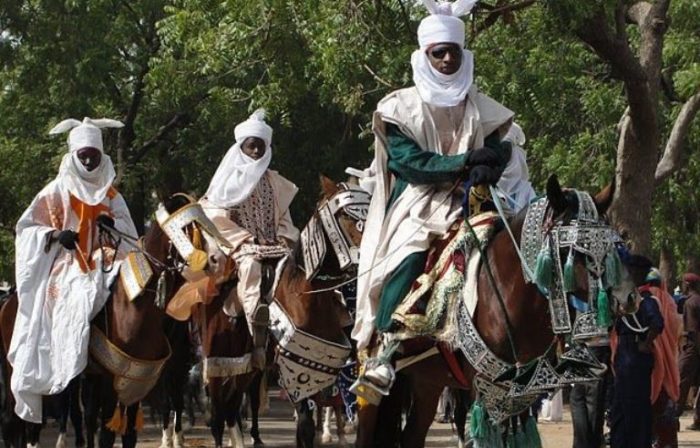
- Region: North and Northwestern
- States: Bauchi State, Borno State, Jigawa State, Kaduna State, Kano State, Katsina State, Kebbi State, Niger State, Sokoto State, Taraba State
- Major Language: Hausa
- Population: 21% of the Nigerian population
- Major Religion: Islam
- Major Occupation: Farming
The second-largest among the ethnic groups in Nigeria is the Hausa tribe which constitutes about 21 percent of the population of the country. Occupying the North and Northwestern region of Nigeria, the ethnic group speaks the Hausa language and practice a homogenized culture which was never affected by the coming of the imperial masters. The Hausa culture is said to be deeply patrilineal and patriarchal. The Hausas are predominant in states such as Borno, Bauchi, Kaduna, Jigawa, Katsina, Kano, Kebbi, Sokoto, Niger, and Taraba; these states are situated between Lake Chad and the River Niger.
Coming to religion, the Hausas are predominantly Muslims with around 99.9% of the population practicing Islam. The other 0.10 percent is shared between Christianity and other religions. According to history, the Northern part of Nigeria embraced Islam through their trade exchange with people from Mali and Guinea. After they adopted Islam, it became one of the key components of their ethnic identity and to date, it has continued to inform the people’s role in modern Nigerian society as well as politics.
The Hausas are often shipped together with the Fulani and called Hausa-Fulani; together, they take the responsibility of adopting and upholding the Sharia law. Sharia is a system of law that is now practiced in 11 northern states in Nigeria. Since Nigeria gained independence from the British imperial masters in 1960, the Hausa-Fulani has been politically dominant in the country. However, their political dominance notwithstanding, the major occupation of the populace remains cattle rearing, farming, and trading.
Igbo
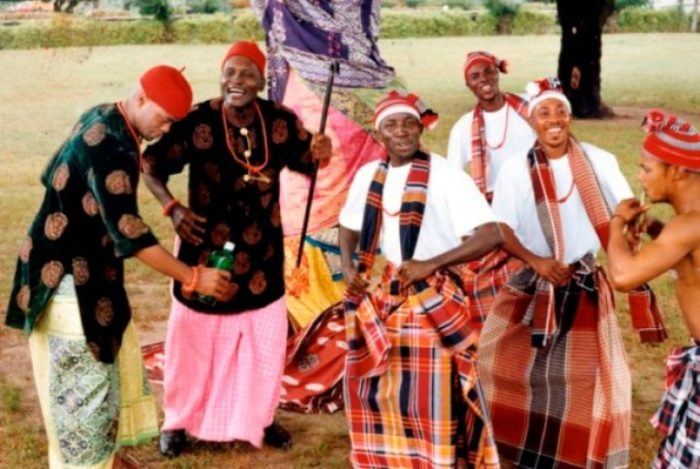
- Region: Southeast
- States: Anambra, Abia, Imo, Enugu, Ebonyi, Rivers Delta, Edo, Kogi,
- Major Language: Igbo
- Population: 18% of the Nigerian population
- Major Religion: Christianity
- Major Occupation: Diverse occupation
The major ethnic groups in Nigeria include the Igbo tribe forming up to 18 percent of the Nigerian populace. Every south easterner speaks the Igbo language with dialectal differences, but they have what is referred to as the central Igbo language which is understood by all and forms the basis for the written Igbo language. The Igbos don’t seem to agree on a single history but the predominant tale about the origin of the Igbo man said that they descended from the ancient Nri Kingdom in the present Anambra State.
Though the Igbos have their own traditions and customs, they are distinct from the Hausa’s and the Yorubas in the sense that they don’t seem to have any hierarchical system of governance. The Igbo man is republican in nature and believes in a traditional republican system made up of a consultative assembly of the natives; this republican setup is meant to guarantee equality to the citizens. However, this does not mean that there are no traditional rulers in Igbo land, their kings are referred to as Eze, Igwe, or Obi.
Occupying the South-Eastern part of Nigeria, the Igbos can be found in states like Anambra, Abia, Imo, Enugu, Ebony, Rivers, Delta, Cross River, Benue, Edo, and Kogi. Over 90 percent of the Igbos converted to Christianity with the coming of the missionaries and a large number of them ended up as Catholics. However, we still have some who struck with their ancient traditional beliefs.
The Igbos are mainly traders and the region has produced some of the biggest traders in the country. We also have Igbos in the education sector, manufacturing sector, civil service, and diverse businesses. Some are expert artisans who engage in all forms of handwork.
Ijaw
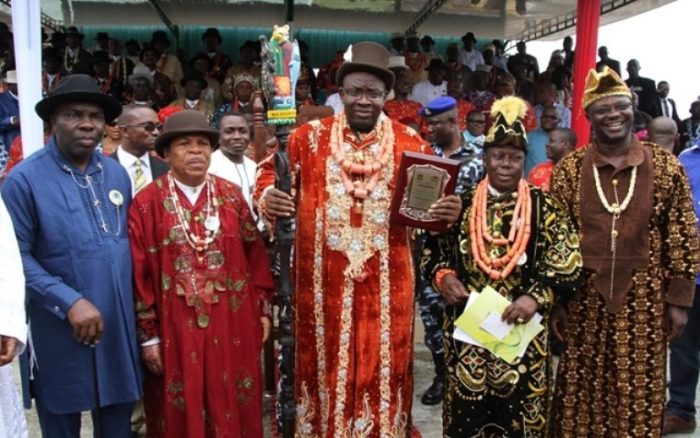
- Region: South-South
- States: Bayelsa, Delta, Rivers, and Ondo
- Major Language: Ijaw
- Population: 5% of the Nigerian population
- Major Religion: Christianity
- Major Occupation: Farming, fishing, and more
The Izon or Ijaw people are called the fourth largest ethnic group in Nigeria, making up to 5 percent of the country’s population. Situated in the Niger-Delta region of Nigeria, the Ijaws can be found scattered in states like Rivers, Bayelsa, Ondo, Delta, and Edo. The tribe has a beautiful culture, complimented by their colorful cultural attire, music, and food. Their community comprises 50 kinship clans mostly engaged as farmers and fishermen. They have their traditional beliefs, though, 70 percent of them practice Christianity. The traditionalists in the Ijaw tribe worship the water spirits known as Owuamapu.
Out of all the regions in the Nigerian enclave, Ijaw land is the richest with regards to mineral resources. Large deposits of oil have been discovered in Bayelsa, Rivers, Cross Rivers, and Delta States. This discovery led to intensive oil explorations that have made their land ecologically unsafe. Despite being the major contributor to the nation’s commonwealth, the Ijaw people are among the poorest people in Nigeria and have also suffered marginalization alongside the Igbos, though they have produced one Nigerian president (Goodluck Ebele Jonathan).
Fulani
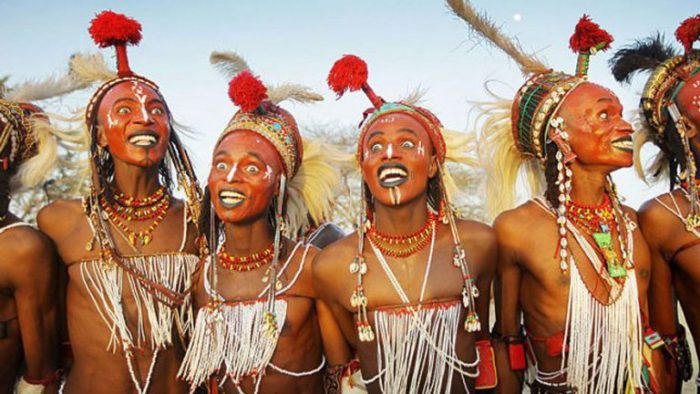
- Region: North
- Sates: Adamawa, Bauchi, Borno, Gombe, Jigawa, Kaduna, Kano, Katsina, Kebbi, Kwara, Niger, Plateau, Sokoto, Taraba, Yobe, and Zamfara
- Major Language: Fula
- Population: 3% of the Nigerian population
- Major Religion: Islam
- Major Occupation: Pasture farming, cattle rearing
The Fulanis earn the 5th position on the list of the top ethnic groups in Nigeria. Also called Fulbe (pl. Pullo) or Peul, the members of the tribe are descendants of nomads from Sub-Sahara Africa and North Africa. Migrating from North Africa and the Middle East, they discovered new settlements in West Africa, Central Africa, and from the Senegal region, the Fulani’s formed the Tekruur Empire; a contemporary empire to the Ghana Empire.
In Nigeria, the Fulani tribe can be found scattered in states like Adamawa, Bauchi, Borno, Kwara State, Niger State, and many others. Their entire population in Nigeria is about 3 percent and they are predominantly Muslims. They are known to speak the Fula language; however, there is evidence of two dialects of Fula in Niger State – western and eastern. The tribe mainly engages in cattle rearing and pasture farming.
A Comprehensive List Of the 250 Ethnic Groups in Nigeria and their Locations
| S/N | States | Ethnic Groups |
| 1. | Abia State | Igbo |
| 2. | Adamawa State | Bachama, Banso (Panso), Batta. Baya, Bilei, Botlere, Bwatiye, Bwazza, Daba, Daka, Palli, Ga’anda, Gira, Gizigz, Gombi, Gude, Gudu, Gwa (Gurawa), Gwamba, Holma, Hona, Ichen, Jibu, Jirai, Kaka, Kambu, Kilba, Kurdul, Lakka, Lala, Mambilla, Mbol, Mbula, Muchaila, Mundang, Njayi, Pire, Sukur, Teme, Tur, Ubbo, Vemgo, Verre, Wagga, Wurbo. Yungur, Kamwe, Longuda (Lunguda), Fulani (Fulbe), Kanakuru (Dera), Margi (Marghi), Maffa, Ngweshe (Ndhang.Ngoshe-Ndhang), Kanuri |
| 3. | Akwa Ibom State | Eket, Anang, Esit Ekid, Ibeno, Ibibio, Iman, Itu, Itu Mbio Uso, Okobo (Okkobor), Oron, Andoni, Ogoni |
| 4. | Anambra State | Igbo and Anioma |
| 5. | Bauchi State | Bambora (Bambarawa), Banka (Bankalawa), Bara (Barawa), Barke, Bele (Buli, Belewa), Boma (Bomawa, Burmano), Bomboro, Buli, Burak, Buta (Butawa), Chama (Chamawa Fitilai), Chamo, Dadiya, Daza (Dere, Derewa), Deno (Denawa), Ouguri, Duma (Dumawa), Galambi, Geji, Gera (Gere, Gerawa), Geruma (Gerumawa), Gingwak, Gubi (Gubawa), Gururntum, Gyem, Jaku, Jara (Jaar Jarawa Jarawa-Dutse), Jimbin (Jimbinawa), Kariya, Kirfi (Kirfawa), Kubi (Kubawa), Kudachano (Kudawa), Kushi, Kwami (Kwom), Miya (Miyawa), Ningi (Ningawa), Pa’a (Pa’awa Afawa), Pero, Polchi Habe, Rebina (Rebinawa), Sanga, Segidi (Sigidawa), Shira (Shira ), Siri (Sirawa), Waja, Warja (Warja), Warji, Zaranda, Zayam (Zeam), Zul (Zulawa), Jukun, Tera (Terawa), Hausa, Saya (Sayawa Za’ar), Jere (Jare, Jera, Jera, Jerawa), Kadung, Limono, Bole (Bolewa), Karekare (Karaikarai) |
| 6. | Bayelsa State | Epie, Izin (Ijaw) |
| 7. | Benue State | Akweya-Yachi, Egede (Igedde), Etolu (Etilo), Nyiffon, Ufia, Utonkong, Yalla, Idoma, Tiv |
| 8. | Borno State | Bura-Pabir, Baggara Arabs, Buduma, Bura-Pabir, Chibok (Kibaku), Chinine, Dghwede, Diba, Fulani (Fulbe), Gamergu-Mulgwa, Gavako, Gwoza (Waha), Hausa, Kamwe, Kanakuru (Dera), Kanembu, Kanuri, Mandara (Wandala), Margi (Marghi), Maffa, Mobber, Ngweshe (Ndhang.Ngoshe-Ndhang), Shuwa, Tera (Terawa) |
| 9. | Cross River State | Abayon, Agbo, Akaju-Ndem (Akajuk), Anyima, Bachere, Bahumono, Bette, Boki (Nki), Efik, Ejajuk, Ejagham, Ekoi, Etung, Idoma, Ikom, Mbembe, Mbube, Iyala (Iyalla), Nkim. Nkum, Qua, Ukelle, Uyanga, Yache, Yakurr (Yako), |
| 10. | Delta State | Anioma, Igbo, Isoko, Isekiri (Itsekiri), Ika, Okpe, Olukumi, Izon (ijaw). Ukwani (Kwale), Urohbo |
| 11. | Ebonyi State | Igbo |
| 12. | Edo State | Edo (Binis), Esan and Afemai (Owan/Etsako) with Akoko Edo, Esan (Ishan), Etuno, Etsako, Igbo, Izon (Ijaw), Okpe, Okpamheri, Owan, Uneme (Ineme) |
| 13. | Ekiti State | Yoruba |
| 14. | Enugu State | Igbo and Membe |
| 15. | Gombe State | Fulani (Fulbe), Tangale, Tula |
| 16. | Imo State | Igbo |
| 17. | Jigawa State | Auyoka (Sub-Hausa), Fulani (Fulbe), Hausa, Kurama(Akurmi) |
| 18. | Kaduna State | Adara (Kadara), Atyap (Kataf/Katab, Attakar, Kagoro, Kafanchan, Marwa/Manchok), Ayu, Bajju (Kaje, Kajji), Bassa, Bina (Binawa), Fulani (Fulbe), Gure, Gwandara, Gwari (Gbagi), Gwong (Kagoma), Ham (Hyam, Jaba, Kajuru (Kajurawa), Kamaku (Karnukawa), Kanikon, Kiballo (Kiwollo), Koro (Kwaro), Kurama(Akurmi), mada, Moruwa (Moro’a, Morwa), Nunku, Ninzam (Ninzo), Rumada, Rumaya, Rishuwa, Srubu (Surubu), Saya (Sayawa Za’ar), Suwa, Uncinda, Hausa |
| 19. | Kano State | Hausa, Fulani (Fulbe), Teshena (Teshenawa) |
| 20. | Katsina State | Fulani (Fulbe), Hausa |
| 21. | Kebbi State | Achipa (Achipawa), Dakarkari, Danda (Dandawa), Duka (Dukawa), Fulani (Fulbe), Hausa, Kambari, Kamaku (Karnukawa), Reshe, Kyenga (Kengawa), Uncinda, Shanga (Shangawa), Zarma (Zarmawa) |
| 22. | Kogi State | Bassa, Bunu, Ebira, Ebu, Gbedde, Gwari (Gbagi), Idoma, Igala, Igbo, Ijumu, Nupe, Ogori, Owe, Oworo, Yagba, Yoruba |
| 23. | Kwara State | Baruba (Batonu), Fulani (Fulbe), Nupe, Yoruba |
| 24. | Lagos State | Awori, Egun (Gu), Yoruba |
| 25. | Nasarawa State | Afo (Eloyi), Alago (Arago), Eggon, Gade, Gwandara, Gwari (Gbagi), Tiv |
| 26. | Niger State | Adara (Kadara), Baruba (Batonu), Bassa, Baushi, Boko (Bussawa, Bargawa), Dakarkari, Gade, Fulani (Fulbe), Gwandara, Hausa, Gurmana, Gwari (Gbagi), Kamaku (Karnukawa), Kambari, Koro (Kwaro), Laaru (Larawa), Lopa (Lupa, Lopawa), Pongo (Pongu), Nupe, Reshe, Ura (Ula), Rubu, Tiv, Uncinda, Yumu, Zabara |
| 27. | Ogun State | Awori, Egun (Gu). Ogun |
| 28. | Ondo State | Ebira, Izon (Ijaw), Yoruba |
| 29. | Osun State | Yoruba |
| 30. | Oyo State | Yoruba |
| 31. | Plateau State | Afizere, Amo, Anaguta, Ankwei, Bada, Bashiri (Bashirawa), Bassa, Berom (Birom), Bokkos, Buji, Burma (Burmawa), Bwali, Challa, Chip, Chokobo, Doemak (Dumuk), Fulani (Fulbe), Fyam (Fyem), Fyer (Fer), Qanawuri, Goemai, Geruma (Gerumawa), Gusu, Irigwe, Jere (Jare, Jera, Jera, Jerawa), Jukun, Jidda-Abu, Kantana, Kenern (Koenoem), Kulere (Kaler), Kwalla, Kadung, Kwaro, Kwato, Mabo, Mada, Mama, Limono, Memyang (Meryan), Milighili (Mighili), Montol, Munga (Mupang), Mupun, Mushere, Mwahavul (Mwaghavul), Ngas (Angas), Ninzam (Ninzo), Nunku, Nokere (Nakere), Pai, Pyapun (Piapung), Ron, Rukuba, Rindire (Rendre), Saya (Sayawa Za’ar), Shangawa (ShanKadunagau), Shan-Shan, Sikdi, Sura, Tiv, Tarok, Yergan (Yergum), Yuom |
| 32. | Rivers State | Abua (Odual), Andoni, Anioma, Bille, Ebana (Ebani), Egbema, Ekpeye, Etche, Engenni (Ngene), Gokana (Kana), Ibani, Igbo, Ikwerre, Izon (Ijaw), Kalabari, Joinkrama, Ke, Kugbo, Obolo, Ogoni, Ogba, Okirika, Udekeama |
| 33. | Sokoto State | Hausa, Fulani (Fulbe), |
| 34. | Taraba State | Bakulung, Hausa, Fulani (Fulbe), Bali, Bambuko, Banda (Bandawa), Betso (Bete), Bobua, Chamba, Dangsa, Chukkol, Gengle, Dghwede, Gonia, Gornun (Gmun), Gwom, Gero, Jahuna (Jahunawa), Jukun, Jonjo (Jenjo), Kanuri, Kenton, Kodei, Kona, Karimjo, Kugama, Kuteb, Kutin, Kunini, Lau, Lama, Lamja, Kwanchi, Mbum, Mumuye, Ndoro, Munga (Lelau), Panyam, Nyandang, Poll, Potopo, Pkanzom, Sate, Shomo, Sakbe, Tarok, Tigon, Tiv, Tikar, Vommi, Waka, Wurkun, Yandang, Yott, |
| 35. | Yobe State | Fulani (Fulbe), Affade, Bura-Pabir, Bade, Bole (Bolewa), Buru, Bura-Pabir, Chibok (Kibaku, Kanuri, Karekare (Karaikarai), Manga (Mangawa), Ngizim, Shuwa |
| 36. | Zamfara | Fulani (Fulbe) |